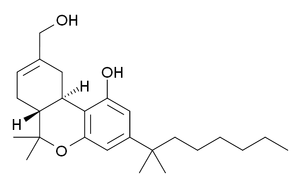HU-210 ist ein synthetisches Cannabinoid. Das Kürzel HU steht für Hebrew University, wo die Verbindung von der Arbeitsgruppe von Raphael Mechoulam synthetisiert wurde. HU-210 ist 100 bis 800 mal wirksamer als das natürliche Tetrahydrocannabinol aus der Hanfpflanze und besitzt eine längere Wirkungsdauer. HU-210 ist das (–)-1,1-Dimethylheptyl-Analogon des 11-Hydroxy-Δ8-tetrahydrocannabinol und wird auch 1,1-Dimethylheptyl-11-hydroxytetrahydrocannabinol genannt.
Chemie[]
HU-210 ist das Enantiomer von HU-211 (Dexanabinol), welches jedoch keine cannabinoide Wirkung zeigt. Die ursprüngliche Synthese von HU-210 basiert auf einer säure-katalysierten Kondensation von (–)-Myrtenol und 1,1-Dimethylheptylresorcinol (3,5-Dihydroxy-1-(1,1-dimethylheptyl)benzol).
Pharmakologie[]
HU-210 aktiviert sowohl den Cannabinoid-Rezeptor CB1, wie auch CB2, es hat höhere Affinität zum CB1-Rezeptor. Im Gegensatz zu Δ9-Tetrahydrocannabinol, dem Hauptwirkstoff des Cannabis, ist HU-210 jedoch ein voller Agonist.
Verwendung[]
HU-210 wird zur Erforschung der Rolle des Cannabinoidsystems verwendet. Nach Angaben der United States Customs and Border Protection wurde HU-210 in Spice Gold nachgewiesen, das 2009 an der US-Grenze beschlagnahmt wurde. 2009 wurde HU-210 in drei weiteren Spice-Produkten in England nachgewiesen.
Verwandte Drogen[]
| Synthetische Cannabinoide | |||||||||
|---|---|---|---|---|---|---|---|---|---|
| Indole | Indazole | ||||||||
| Naphthaline | Naphthoylindole: AM-1220, AM-1235, AM-2201, AM-2232, EAM-2201, JWH-007, JWH-015, JWH-018, JWH-019, JWH-073, JWH-081, JWH-122, JWH-210, MAM-2201 |
Naphthoylindazole: THJ-018, THJ-2201 | |||||||
| Adamantane | Adamantoylindole: AB-001 Indol-3-Carbonsäureamide: Apica, STS-135 |
Indazol-3-Carbonsäureamide: AKB48, 5F-AKB48 | |||||||
| Benzole | Iodobenzoylindole: AM-694, AM-2233 Phenylacetylindole: JWH-203, JWH-250 |
||||||||
| Cyclopropane | Acyle: UR-144, XLR-11 |
||||||||
| Chinoline | Indol-3-carboxylate: BB-22, 5F-PB-22 |
||||||||
| Sonstige | AB-Fubinaca, AB-PINACA, ADB-PINACA, ADB-FUBINACA, MDMB-FUBINACA | ||||||||
| THC-Analoga | |||||||||
| DMHP, CP-47,497, 2-Isopropyl-5-methyl-1-(2,6-dihydroxy-4-nonylphenyl)cyclohex-1-en, HU-210, HHC | |||||||||
